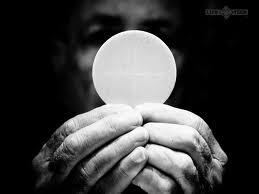 “Look daddy, ” my two-year-old daughter said on Sunday, pointing to the communion table, “Jesus gave us more food again.”
“Look daddy, ” my two-year-old daughter said on Sunday, pointing to the communion table, “Jesus gave us more food again.”
I don’t write nearly as much about little Zoe as I do about my boy, Mattias. First of all, he’s seven. He has a little more living under his Garanimals belt. He’s also brilliant, incredibly complicated and a whole lot like me in some ways. This isn’t to say Zoe isn’t smart, but how much of an intellectual force can you be while you’re still eating dirt and pooping yourself!
I also figure people would quickly get tired of hearing every adorable anecdote about her cuteness. For me, it’s great; I completely adore her. But for the rest of you following along, it’s boring at best, and more likely nauseating.
But this comment of hers really struck me. On first blush, I wondered if she imagines this Jesus guy much like she does the Easter Bunny, sneaking in and dropping communion bread and juice on the altar once a week while we’re not looking. She’s not quite ripe enough to understand the importance of such abstract symbolism. Hell, it was just last week that she started announcing at every stop light what I should be doing based on the color code she had finally deciphered.
Regardless of how she meant it, the words, once filtered through my adult imagination, took on a pretty profound weight. Our denomination practices communion every week, and at our church in particular, we celebrate a radically open table, placing no asterisks on the welcome we extend to all who choose to take part.
Does that mean we all understand the practice of communion the same? Of course not. There are those in our faith community who strongly believe that Jesus died for our sins, and given the prevalence of lifelong Catholics who have found their way to us, I’d guess a few of them hang on to their belief that, once blessed, the bread and juice literally transform into the body and blood of Jesus.
But we’re not there to tell them what communion has to mean to them. We’re there to serve.
As our kids express a curiosity about the table, we talk with them about it. So far, we’ve focused on the idea that it’s a practice of remembrance, helping us keep in mind that God loves us. In worship, Amy (my wife and pastor of the church) always talks about the act of remembering as a specific re-membering – a reconciling the brokenness – of Jesus, of ourselves, and of the world.
I don’t expect Mattias to get all that just yet, and I certainly don’t figure Zoe would appreciate the double implication of remembrance. But based on her statement, I’d say she’s figuring out plenty on her own.
I like the idea of communion being an act of taking our daily bread, living out the words of the Lord’s Supper, and accepting the gift of physical and spiritual sustenance God provides.
Zoe may be under the impression that Jesus works at the bakery down on Union Avenue, but based on where she is in life, that’s not a bad understanding. She has the rest of her life to craft that understanding into what it may eventually become.
That is, if she hasn’t actually got it all figured out already, and we’re the ones trying to catch up.
—-
Christian Piatt is an author, editor, speaker, musician and spoken word artist. He is the creator and editor of BANNED QUESTIONS ABOUT THE BIBLE and BANNED QUESTIONS ABOUT JESUS. Christian has a memoir on faith, family and parenting being published in early 2012 called PREGMANCY: A Dad, a Little Dude and a Due Date. Visit www.christianpiatt.com, or find him on Twitter or Facebook.
